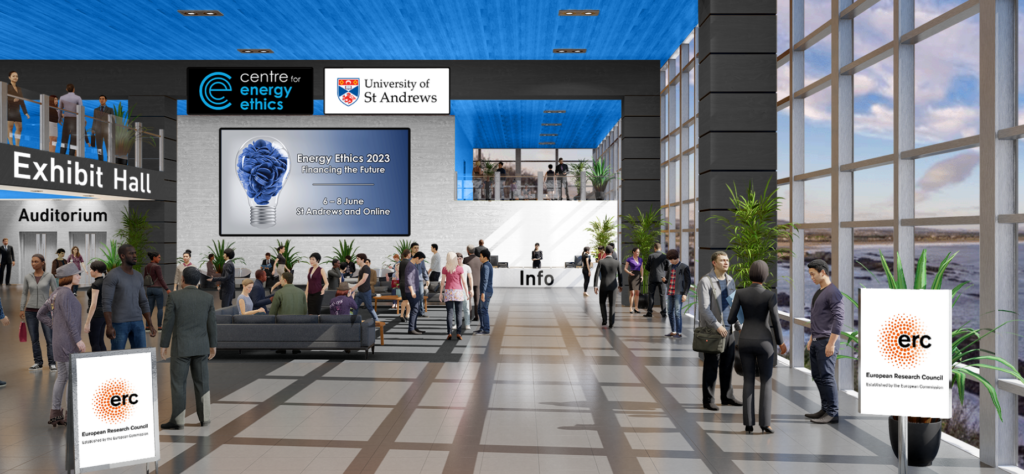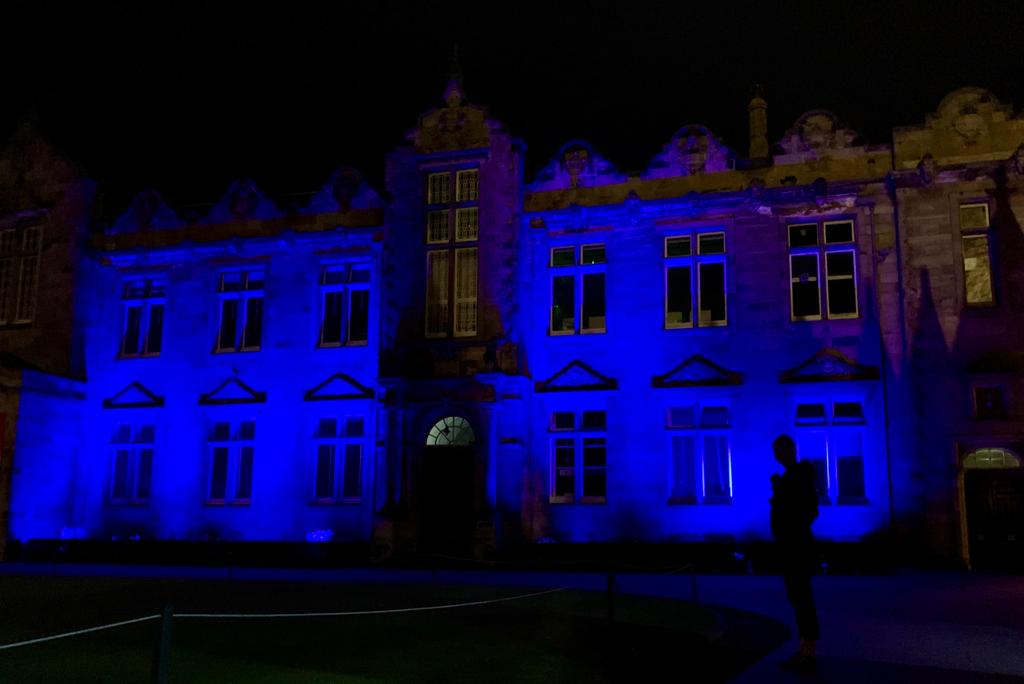St Andrews hosted the fourth international Energy Ethics conference on the theme ‘EE2023: Financing the Future’ on 6-8 June 2023. Organised by the Centre for Energy Ethics (CEE), the conference brought together over 130 experts from 23 different countries, securing St Andrews’s place as a hub for interdisciplinary cross-sectoral energy research.
Leading academics from the arts, humanities, social sciences and natural sciences across the world worked together with industry professionals and policy makers for the three-day conference in the newly refurbished Younger Hall. Funded by the European Research Council and the CEE, the conference was one of the largest hybrid events ever held at the University.

EE2023 comes at a significant time for energy and climate research. Record high temperatures, chaotic weather patterns, and the knock-on effects of the war in Ukraine on energy markets have given new urgency to the dilemma of balancing energy demands with a transitioning to low carbon energy solutions in an equitable and just way.
Led by CEE Director Dr Mette High and CEE Director of Policy Dr Sean Field, the conference featured a series of internationally renowned academic speakers spread across 39 concurrent panel sessions, 3 keynote addresses, a participatory workshop led by CEE Artist-in-Residence Rebecca Sharp, poster prizes, and an extensive events programme with whisky tasting and tours of Eden Campus. EE2023 speakers included Professor Stephanie LeMenager, the Barbara and Carlisle Moore Professor of English and Professor of Environmental Studies at the University of Oregon. She was joined by Professor Andrew Barry, Professor of Human Geography at University College London and co-convenor of the UCL Anthropocene initiative. In addition to academic speakers, EE2023 also featured a keynote address by Gillian Martin, MSP for Aberdeenshire East and Scottish Government Minister for Energy, introduced by Professor Brad MacKay, Dean of the Business School, Deputy Principal, and Vice-Principal (International Strategy and External Relations).
EE2023 was not only ambitious in its line-up of speakers. It was also ambitious in how it was organised. To create the best possible research environment in which to bring together such a diverse group of stakeholders, EE2023 was organised around two specific values: Interdisciplinarity and Inclusivity.
Why interdisciplinarity? Bringing together different disciplines, the conference provided rich discussions informed by diverse methodologies, research questions, findings, and identified scholarly gaps. The aim, and one of the great successes of the conference, was to attract presenters from a broad range of disciplines, enable the sharing of knowledge, and inspire the emergence of new and innovative research agendas. Some of these agendas will be taken forth by the new Scottish Funding Council strategic consortium initiative “Scottish Research Alliance for Energy, Homes and Livelihoods”, directed by Dr Mette High and involving universities, industry, business, policy makers, and community organisations across Scotland. The theme of “Financial Pathways” within the Alliance is led by Dr Sean Field and will build new cross-sector research teams to tackle some of the challenges identified at the EE2023.
Why inclusivity? In line with the ethos of interdisciplinarity, the organisers wanted to make the conference a meeting place for a broad range of voices and perspectives. Creating an inclusive conference meant that it had to be hybrid, enabling attendees to participate online and in person. In this way, financial circumstances, visa requirements, and the ability to travel would be less of an obstacle to participate in the conference. The hybrid format also enabled conference delegates worldwide to minimise their carbon footprint by participating online rather than travelling to St Andrews. The hybrid conference format offered greater flexibility not only for those who couldn’t attend in-person, but also for those in St Andrews – if delegates preferred to sit outside or go for a walk, they could continue to participate in the conference on the custom conference app built by vFairs.

However, a hybrid conference wasn’t sufficient to deliver the inclusivity that was envisioned. The organisers also made sure there was free childcare available to delegates. This meant that delegates with childcare responsibilities could still attend the conference with no extra financial burden. It was also crucial to provide low-cost accommodation within only a short distance from the conference venue – and, of course, keep the conference delegate fee low. Keeping costs low for delegates meant that the conference was accessible for postgraduate and early career researchers, making it possible for them to truly take part in and benefit from the great discussions.
Conference organiser Dr Mette High said: “We wanted to do what we could to provide an interdisciplinary and inclusive EE2023 conference environment – and we are thrilled to see that this really resonated with researchers globally! It was such an ideal environment in which to share findings and push forward the debates on envisioned energy futures. Watch this space for what comes next.”





